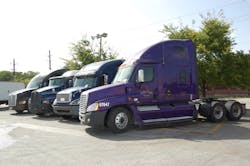MIT study: Slim health savings from fuel economy mandates
A study released this week by the Massachusetts Institute of Technology (MIT) determined that the monetary health benefits gained from carbon emission reduction policies based on fuel economy mandates are very low, barely recouping a quarter of the cost of implementation. By contrast, MIT researchers said cap-and-trade policies can generate health savings worth over ten times the cost of policy implementation.
Noelle Selin, a professor of engineering systems and atmospheric chemistry at MIT and co-author of the school’s study, compared the health benefits to the economic costs of three climate policies: a clean-energy standard, focused on reducing emissions for power plants; a transportation policy focused on mandating higher vehicle fuel economy standards; and a cap-and-trade program.
Selin said that MIT’s research found that savings from avoided health problems could recoup only 26% of the estimated $1 trillion cost – in 2006 dollars – to implement a policy focused on rigid vehicle fuel-economy requirements, while a clean energy program barely provided positive return of investment (ROI) with associated health benefits just edging out costs at $247 billion versus $208 billion.
The best clean-air health savings ROI comes from cap-and-trade programs, MIT’s research determined, delivering savings worth up to 10.5 times the estimated $14 billion cost of implementing such a policy.
Selin noted that the difference in health savings achieved under those three clean air regulatory schemes depended largely on the costs of the policies, as the savings — in the form of avoided medical care, lower rates of asthma, and saved sick days — remained roughly constant.
In the end, she said policies aimed at specific sources of air pollution, such as power plants and vehicles, did not lead to substantially larger benefits than the cheaper cap-and-trade approach.
Selin added that MIT’s research group paid especially close attention to how changes in emissions caused by policy translate into improvements in local and regional air quality, using comprehensive models of both the economy and the atmosphere.
In addition to carbon dioxide, MIT’s researchers calculated the health impact of ground-level ozone, as well as fine particulate matter, developing models to show where and when these chemical reactions occurred, and where the resulting pollutants ended up — in cities where many people would come into contact with them, or in less populated areas.
Health savings, then, were calculated based off reductions in ground-level ozone and fine particulate matter, as both pollutants can cause asthma attacks and heart and lung disease, leading to premature death.
Yet Selin cautioned that while cutting carbon dioxide from current levels in the U.S. will result in savings from better air quality, pollution-related benefits decline as carbon policies become more stringent. After a certain point, most of the health benefits have already been reaped, and additional emissions reductions won’t translate into greater improvements, she stressed.
About the Author
Fleet Owner Staff
Our Editorial Team
Kevin Jones, Editorial Director, Commercial Vehicle Group
Cristina Commendatore, Executive Editor
Scott Achelpohl, Managing Editor
Josh Fisher, Senior Editor
Catharine Conway, Digital Editor
Eric Van Egeren, Art Director
